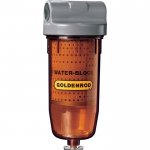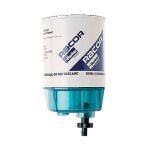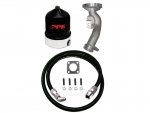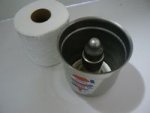The boating community has a different take on this. Diesel itself doesn't "go bad". Crud grows in it, and containers deteriorate a drop crud into it, and it's the crud that causes you problems. Additives can make the diesel toxic to microorganisms that would otherwise like to grow there. Good containers can minimize that source of crud. But you still have to worry about moisture entering the tank in the form of humid air, that can then condense into water when the temperature drops. Critters then grow in that water, creating crud. The water can also corrode your container, adding more crud.
Sometimes the diesel has crud in it when you first put it in the tank. It can look OK, but contain enough water and/or microorganisms to cause a bloom in your tank.
Boaters have "fuel polishing systems" that pump the stored fuel through a filter and water separator. If I were storing fuel in bulk, I would rig one of these. You want the fuel exit plumbing to come out of a port at the lowest point of the tank, so any crud will settle there and be drawn out of the tank by the fuel polisher. Pick-up tubes work poorly because they allow crud to settle at the bottom, inaccessible to the fuel polishing system. I'd also rig the fuel return to end in a flexible length of hose that sits on the bottom of the tank and flails around when the pump is running. This would stir up anything that settled at the bottom, helping keep the fuel clean.
Do the math on the size of your tank and the throughput of your fuel polishing system. I'd want to run mine often enough that all the fuel goes through the filter at least once a month. More often might be wise in high humidity like the tropics during monsoon season, or if you live in wetlands. If you live in the high desert where moisture is not an issue, a fuel polisher might be overkill.
You can also get a centrifuge that will spin the fuel and remove particulates. You have to clean it, which is messy, but some say it cleans better than a filter. You need a high-pressure pump to make the centrifuge work. I had a rig like this when I was experimenting with biodiesel. I used a centrifuge and a water separator to polish the stored fuel. Cleaning the centrifuge gave me direct hands-on contact with the crud being removed from the diesel. You might consider that a blessing or a curse.
There is a
company that makes a polisher for the lube oil in your engine. It keeps the oil in your diesel clear, not black. Some tap it into the high-pressure side of the oil circuit, usually by putting an adapter between the oil filter and the engine. Some just plug the truck into shore power at night, and run the polisher then with a 110V pump. You have to add plumbing to your oil system, like you do when you add a turbo. But you then have a diesel without crud in the oil. It filters through a roll of toilet paper, believe it or not. You could also use one of these to polish your fuel.
If you run your fuel polisher and it removes a substantial amount of water, you need to polish longer and more often until it rarely finds water. Water is usually visible in a plastic bowl beneath the filter.










